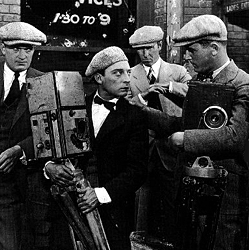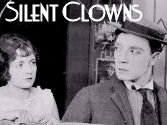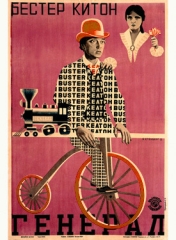THE CAMERAMAN
(1928)With Buster Keaton, Marceline Day, Harold Goodwin, Sidney Bracey, Harry Gibbon
Directed by Buster Keaton and Eddie Sedgwick
Silent, Black and White
Reviewed by JB
 Fed up with creative restrictions on his films by
the
higher ups - restrictions put in place because his last several films
lost money - Buster Keaton left the independent umbrella of
United
Artists and signed with MGM. Though the move was soon to
prove to
be artistically and personally disastrous for Keaton,
you
wouldn't know it by THE CAMERAMAN, one of the
comedian's finest,
most polished silent comedies.
Fed up with creative restrictions on his films by
the
higher ups - restrictions put in place because his last several films
lost money - Buster Keaton left the independent umbrella of
United
Artists and signed with MGM. Though the move was soon to
prove to
be artistically and personally disastrous for Keaton,
you
wouldn't know it by THE CAMERAMAN, one of the
comedian's finest,
most polished silent comedies.
Keaton plays a street photographer working for ten cents a portrait, who gives up this nowhere career for the glamor and excitement of newsreel photography. Of course, he meets a girl and falls in love with her immediately, and of course, there is an oaf who is a potential rival in love. But none of this matters. THE CAMERAMAN is a sweet, romantic comedy, but the story is simply something onto which Keaton can hang some of his most memorable gags and comedy sequences. There is a pantomimed inning of baseball at old Yankee Stadium in which Keaton the Pitcher completes a complicated triple play and Keaton the batter then hits an inside-the-park home run. Another sequence has Keaton trying to open his little dime bank, wrecking his rented room in the process. I don't want to spoil it all, but one of the highlights has Keaton covering a Chinatown parade which suddenly turns into a Tong War. 1 In his early thirties, Buster Keaton may have been in his physical prime, if one judges by the many virtuoso running sequences throughout the film.
At MGM, the change in Keaton's character is subtle yet noticeable. Uncredited producer Irving Thalberg and his theories on comedy (theories later codified during the making of the Marx Brothers' film A NIGHT AT THE OPERA) may have had a hand in opening up Keaton's character to a point where several times in the film "The Great Stone Face" can be seen showing anger. Lovestruck throughout the film, Keaton is also called upon to pull off the kind of pathos Charlie Chaplin was famous for, and yet, because Keaton was a superb actor, it doesn't do his character any harm. (Compare this to the occasionally sickening softening of Groucho Marx's character in their MGM days).
For years at MGM, THE
CAMERAMAN
was used as a teaching device to all comedians that
came to
work at that studio. Yet ironically, it was to be Keaton's
last
great silent comedy.  - JB
- JB


